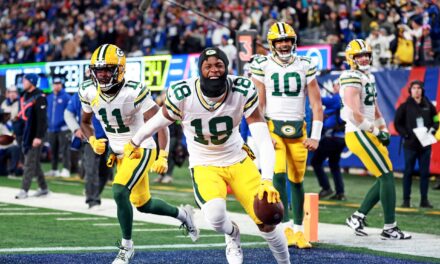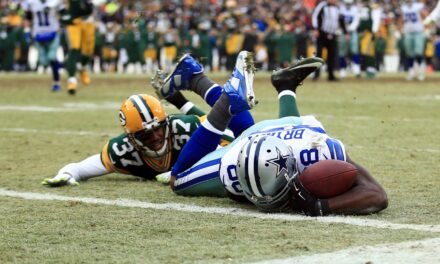The Aaron Rodgers Era is coming to a close. On Wednesday, Rodgers announced that he intends to play football in 2023 and that he wants to be traded to the New York Jets. The final details of the trade need to be worked out and hopefully that happens sooner rather than later. The Packers will be moving on to Jordan Love as their starting quarterback.
Rodgers has been with the Green Bay Packers since 2005. That’s 18 seasons in Green and Gold and Rodgers has certainly left his mark on the franchise. In 15 seasons as the team’s starter, he led the Packers to the playoffs 11 times, earned Pro Bowl honors 10 times, won four league MVPs, was All Pro four times and led the Packers to a victory in Super Bowl XLV where he was named the MVP of the game.
Ironically, the Packers weren’t preparing to draft Rodgers in 2005. He and Alex Smith were the top two candidates to be the first player picked in the draft that year. The 49ers went with Smith and cost Rodgers a chance to play for the team he grew up rooting for. Rodgers kept falling in the draft as teams chose players like Troy Williamson, Erasmus James and Matt Jones ahead of the Cal quarterback.
Rodgers fell all the way to 24th in the draft where the Packers felt he was simply too good to pass up. Although they still had Brett Favre, they added Rodgers who immediately had a chip on his shoulder for being passed up in the draft.
Rodgers took over as the Packers starter in 2008 after attempting just 59 passes in three seasons backing up Favre. He faced a difficult task of replacing a legend and future Hall of Famer who was the most popular player on the team for 16 seasons. Favre had a messy divorce from the Packers full of drama and twists and turns and suddenly Rodgers was put on the spot.
He responded well. Rodgers threw for more than 4,000 yards in his first season as a starter and tossed 28 touchdown passes. The Packers struggled to a 6-10 record but they knew they had something special in their new franchise quarterback.
The biggest difference between Rodgers and his predecessor was that Favre was a lot more reckless with the football. The Gunslinger threw 286 interceptions in his 16 seasons in Green Bay and eventually became the NFL’s all-time leader in that category. Favre’s interception percentage with the Packers was 3.3 and he twice led the league in picks thrown with Green Bay. Rodgers, on the other hand, has a career interception percentage of 1.4 and threw just 105 interceptions in 223 starts.
In 2009, Rodgers led the Packers to the playoffs for the first time. Although the Packers lost in overtime, Rodgers threw for 423 yards and four touchdowns and showed he could play well in big games.
One year later, Rodgers led the Packers to a Super Bowl title. He was outstanding in the Packers upset of the top-seeded Falcons, made a vital shoelace tackle in the NFC Championship Game and then enjoyed an MVP performance against the Steelers in Super Bowl XLV.
The following season, Rodgers won his first MVP and led the Packers to a 15-1 record, the best in franchise history. He won the MVP again in 2014 and was clearly on top of his game.
Rodgers had a knack for last minute heroics, whether it was a Hail Mary against the Cardinals or Giants in the playoffs or his famous throw to Richard Rodgers on the final play of the game against the Lions. In 2013, Rodgers threw a 48-yard touchdown pass to Randall Cobb in the final minute of the season finale in Chicago to beat the Bears and win the NFC North title.
Rodgers dealt with injuries that caused him to miss significant time in two seasons. In 2013, he suffered a broken collarbone that cost him to miss seven games. He was able to return late in the season to help the Packers win the division and sneak into the playoffs.
In 2017, he only played seven games after Minnesota’s Anthony Barr caused him to have a fractured collarbone after a questionable hit.
Rodgers and the Packers continued to make the playoffs consistently, but the team fell short in the NFC Championship Game in 2014, 2016, 2019 and 2020.
There was off the field friction between Rodgers and head coach Mike McCarthy that contributed to McCarthy’s firing late in the 2018 season.
In 2020, the Packers surprised everybody by selecting Jordan Love in the first round of the NFL Draft without notifying Rodgers. That made the relationship between the Packers front office and their star quarterback even more contentious.
Rodgers bounced back and won back-to-back MVP awards in 2020 and 2021, but each offseason, there were questions as to whether the star quarterback was still happy in Green Bay and whether he would retire or demand a trade. There was plenty of blame to go around on both sides as the Rodgers-Packers relationship deteriorated.
Last season we didn’t see Rodgers at his best. He suffered a broken thumb in Week 5 against the Giants but played through it. Later in the season, he injured his ribs. He also struggled with a new group of mostly young receivers after the departure of Davante Adams. Rodgers didn’t throw for 300 yards in any game in 2022 and had his lowest quarterback rating since becoming the team’s starter.
The Packers were also upset that Rodgers didn’t attend offseason OTAs to work with his new receivers and the tensions between the quarterback and the front office increased after the season ended with a disappointing 8-9 record and without a playoff berth.
On Wednesday, Rodgers announced that he wanted to continue his NFL career and to be traded to the New York Jets. The details of the trade and the compensation still need to be worked out but Rodgers’ time in Green Bay is all but over.
For now, the tensions between Rodgers and the team leaves a bad taste in many fans’ mouths. But Rodgers now joins other all-time great quarterbacks who will finish their careers with other teams. Johnny Unitas ended his career with the Chargers, Joe Namath was a Ram in 1977, Joe Montana finished up with the Chiefs while Brett Favre finished with the Vikings.
In the end, Rodgers will end up in the Packers Hall of Fame and the Pro Football Hall of Fame and he will have his jersey number 12 retired by the Packers. Rodgers will be remembered as one of the greatest players to wear the Green and Gold and his legacy in Green Bay is secure. With the Rodgers, the Packers always had a chance to win and we knew they’d be among the league’s best teams nearly every year.
But right now, his time with the Packers is ending and a new era begins for the Packers and for Aaron Rodgers.
Follow Gil Martin on Twitter @GilPackers
Click here for more great Packers coverage



